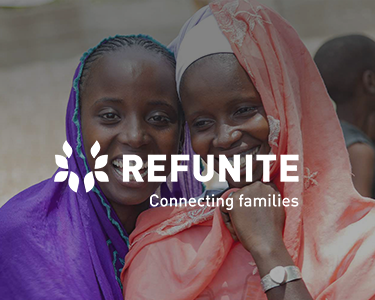
February 28, 2014 – Richard Ngamita is hard at work enhancing Refugees United‘s mobile search tool used to reconnect families. What appears at first to be a complex series of data points, Richard Ngamita sees as a light that leads to a sole mission: reconnecting separated refugees families.
From his office in Uganda, Richard, a Data and Analytics Project Manager whose one-year anniversary with Refugees United is only a month away, is building a more intelligent search with the rest of the tech team in Kenya and Denmark. Before joining Refugees United, Richard’s technological expertise was honed at Google, where he worked on SMS data – work that paved the way for this job.
“I’m working on what we call ‘recommendations and notifications,’” he explains, “which means we want to proactively recommend profiles to registered refugees. Essentially, once someone is registered, the search tool will be able to work for them – even when they are not actively searching.
By analyzing how users are communicating, where they are from, and what their activity looks like, we can find, with greater accuracy, two people who may know one another. And then we can send them a notification, encouraging them to log into the mobile search tool and confirm the reconnection.”
Richard’s work directly responds to a pervasive lack of internet access among refugees. Refugees United’s mobile search tool has been developed specifically with this population in mind – placing greater emphasis on the technological needs of refugee families.
“One challenge we face is that most users come to the search tool through a low-end mobile phone,” he says. “They have limited internet. Our new recommendations and notifications will allow us to reach them through simple SMS, so they are more likely to find family through our service.”

Refugees United has already created a mobile search tool that serves more than 280,000 registered users. As Richard transforms data points into innovative solutions, he reflects on the magnitude of the challenges facing refugees.
He recalls once meeting brothers in Kakuma Refugee Camp in Kenya who had reconnected over the www.refunite.org platform. As he listened to them recall the story – each step they took – he felt the significance of transforming a wealth of data into a simple mobile tool.
“It reassured me to see how helpful our work is – to see how important it is in helping people who have nowhere else to turn.”

The challenge of developing a sophisticated platform, accessible from low-cost mobile phones, has inspired much of the work Richard has done at Refugees United, including a favorite project of his which involved improving the organization’s USSD system. Simply put, USSD allows users with low-end mobile phones to access the internet using a text message short code. As an example, Refugees United’s short code for Kenya is *883#.
They send the code as an SMS and automatically receive responses that prompt them to build their online profile and allow them to access the mobile search tool. There is no computer – no traditional internet connectivity – required.

Though they may not be familiar with the term ”USSD,” Richard explains that ”users are nonetheless familiar with how it works.”
“They use it every day – when you add credit to your phone, you’re using a USSD system. So we saw an opportunity: people use this, they like it, we can reach them through this. And when we rolled out the system, we saw an immediate uptick in registration.”
Such upticks evidence what Richard sees as the greatest use of technology in humanitarian interventions: scalability.
“Responding to a new crisis is all about scaling. How can you reach many refugee families at the same time? With technology, you can scale the next day to the next 100,000 people.”
Despite his technological prowess, however, Richard’s interests are hardly limited to his work at a computer. He’s lived in four countries, traveled to more than fifteen, and has recently combined his interest in creating new things with his fascination with different African cultures: he designs furniture using unique African fabrics. On more low-key days, Richard enjoys rugby, basketball, and spending time with his wife and daughter.
As Richard works with the tech team to produce a smarter search tool, he is building technological solutions for separated families. Before he returns to his work, Richard says with tempered but confident optimism, “Technology is the best way to reach the people who need us.”
By Carolyn Nash, Communications Coordinator for Refugees United (cn@refunite.org).


